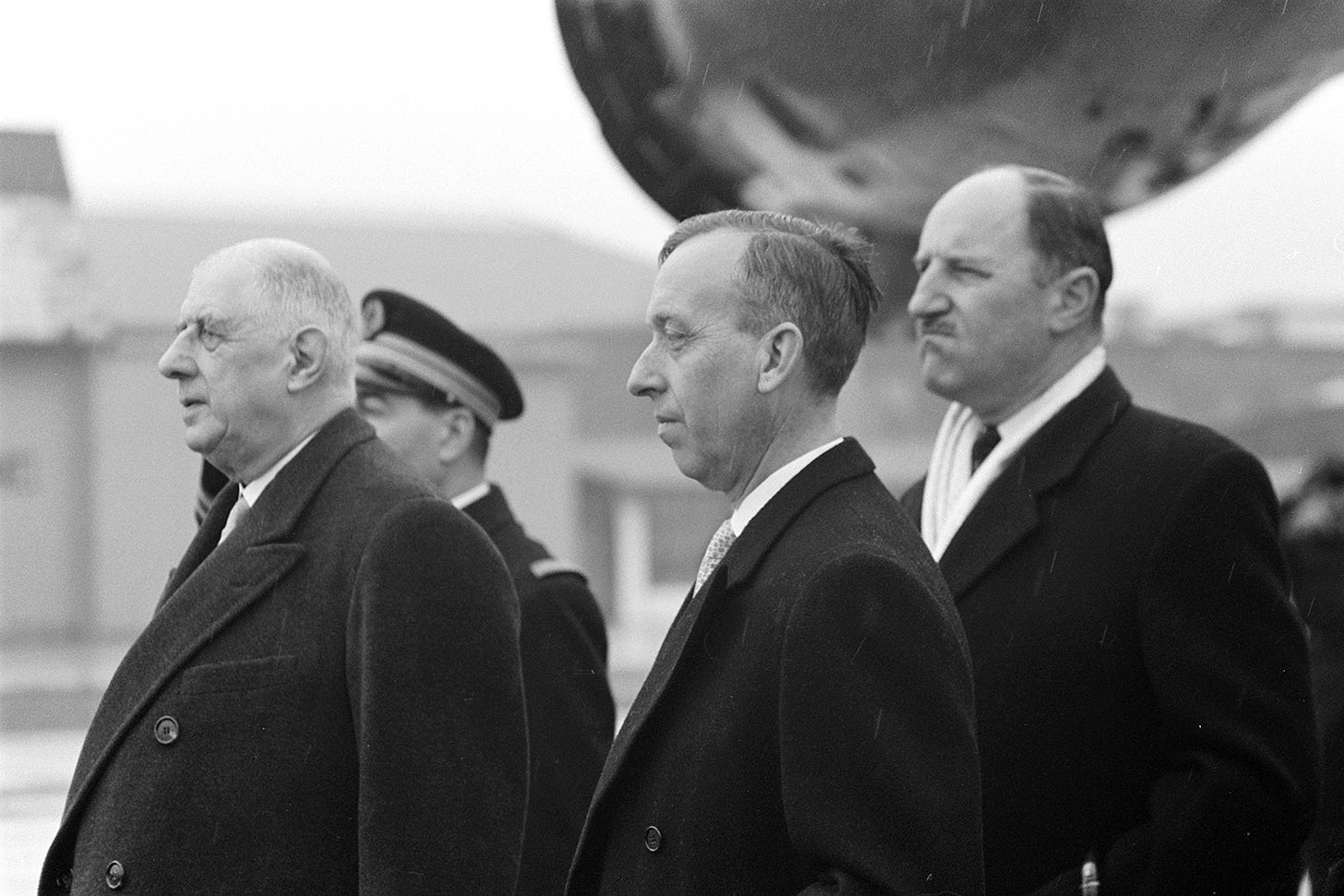Three Political Traditions Explain the French Election
Charles de Gaulle's two-party system has broken down.
France’s divisions haven’t healed. Like five years ago, Emmanuel Macron, the candidate of the cities, the optimists, the outward-looking and the university-educated, faces Marine Le Pen, the candidate of the small towns, the worried, the inward-looking and the working class, in the second and final voting round of the presidential election.
The surprise of the first round was Jean-Luc Mélenchon’s strong third-place finish with 22 percent support, behind Le Pen’s 23 percent and Macron’s 28.
Rather than a country split in two, France turns out to have three political blocs of almost equal size.
This is a throwback to earlier times. Historian Sudhir Hazareesingh writes that France had three political families until Charles de Gaulle replaced proportional representation with a two-round voting system in 1958 that encouraged the formation of two parties. The center-right united into what is now the Republican party. The Communists were eclipsed by the Socialists on the left.
Three traditions
Macron’s progressive centrism broke the Gaullist right and Socialist left. Although the two remain strong in local and regional politics, where neither Macron nor Le Pen has put down roots, nationally the parties that dominated French politics for decades are still plotting their revanche.
Macron stole liberals from the right and social democrats from the left. The Republican candidate this year, Valérie Pécresse, won barely 5 percent of the votes. Anne Hidalgo, the Socialist candidate and mayor of Paris, couldn’t even get 2 percent, less than the Communist Fabien Roussel.
Macron’s politics remind Hazareesingh of Orléanism, the movement that overthrew the reactionary King Charles X in 1830 in favor of his cousin, Louis Philippe, the duke of Orléans, who promised to rule as a constitutional monarch. Louis Philippe was himself overthrown in 1848, but the bourgeois coalition that had backed him would go on to form the central party of the Third and Fourth Republics.
Le Pen is the inheritor of the authoritarian and revanchist nationalism that sprouted in the wake of France’s defeat in the 1870-71 war with Prussia. Like far-right movements everywhere, its history is one of big men rather than big ideas: from Georges Ernest Boulanger in the late 1800s to François de La Rocque in the 1930s to Marshal Philippe Pétain and his collaborationist Vichy regime in the 1940s to Pierre Poujade’s anti-tax revolt in the 1950s. Le Pen’s father and predecessor as party leader, Jean-Marie, started out in politics as a parliamentarian for Poujade.
Another influence was opposition to Algerian independence (father Le Pen fought in the 1954-62 war) and the flight of white Algerians, or Pieds-Noirs, to the south of France.
Mélenchon’s radical left will claim the mantle of the 1789 French Revolution, but it owes more to the 1871 Paris Commune, France’s strong mid-twentieth-century Communist Party and its militant trade unions.
Challenges
Macron’s challenge is to hold together a “Third Force” of moderates from the left and right. His predecessors failed in the 1950s, precipitating de Gaulle’s return to power. Their only previous comeback was in 1974, when the liberal Valéry Giscard d’Estaing prevailed over Gaullist candidates on the right and defeated the left’s François Mitterrand in the presidential election. Mitterrand beat Giscard seven years later. (Presidential terms were reduced from seven to five years in 2000.)
Le Pen must appeal to the economic concerns of her “Poujadist” voters in the north and east without alienating her wealthier and socially more conservative, historically Pied-Noir base in the south. The latter were drawn to Éric Zemmour’s culture-war rhetoric in the first voting round. Many in the former group might have voted for the left when the Communists were strong, but then their towns deindustrialized and the post-Mitterrand Socialists lost touch with the working class. It’s why Le Pen has focused her campaign on low wages and high living costs.
Mélenchon’s supporters ought to prefer Macron over Le Pen, but the French far left isn’t known for its pragmatism. Polls predict about a third will sit out the second voting round.




